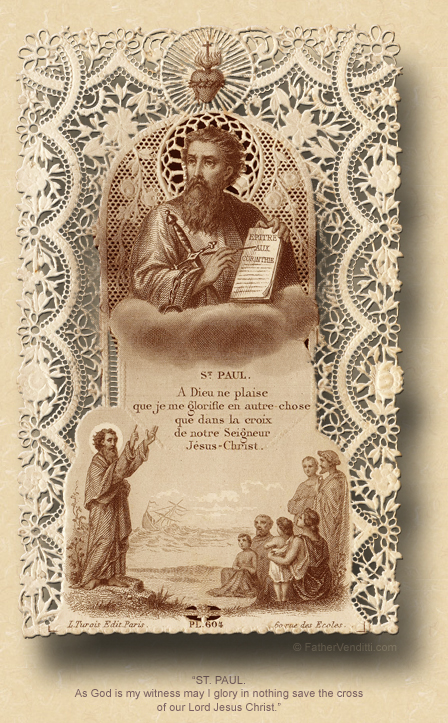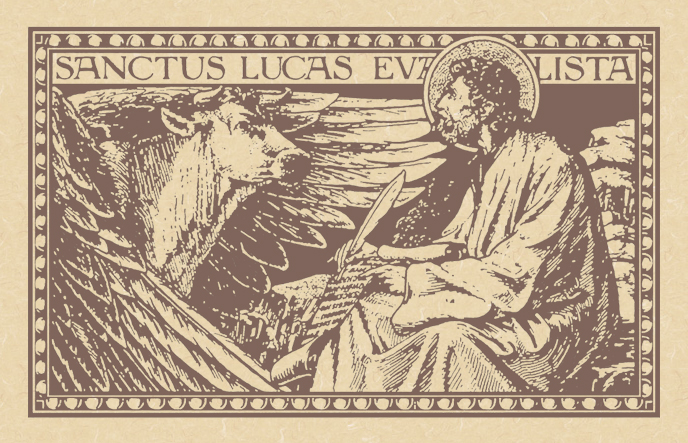Grace Is Not a Fairy Tale.
The Third Friday of Easter.
Lessons from the feria, according to the ordinary form of the Roman Rite:
• Acts 9: 1-20.
• Psalm 117.
• John 6: 52-59.
The Second Friday after Easter.*
Lessons from the dominica,** according to the extraordinary form of the Roman Rite:
• I Peter 2: 21-25.
• [The Gradual is omitted.]
• John 10: 11-16.
Myrrh-Bearers Friday; and, the Feast of the Holy Apostles Aristarchus, Pudens & Trophimus.
Lessons from the pentecostarion, according to the Ruthenian recension of the Byzantine Rite:
• Acts 8: 40—9: 19.
• John 6: 48-54.
FatherVenditti.com
|
 10:31 AM 4/15/2016 — All this week we've been looking at the apostolic lessons at Holy Mass, all taken from the first six chapters of the Acts of the Apostles, which I had referred to at the beginning of the week as the last chapter of Luke's Gospel. That Saint Luke wrote the Acts of the Apostles has never been in dispute: his authorship is mentioned in the Muratorian Fragment and in the writings of Saint Irenaeus, both coming from the second century, and in the third century it's mentioned by Saint Clement of Alexandria, Origen and our old friend, Tertullian. Both books, Luke's Gospel and Acts, begin with a dedication to a man named Theophilus, a name which means “lover of God,” and on that basis some has suggested that Theophilus was not a real person but rather anyone who would be reading these books to learn more about the life of our Blessed Lord. The date of the composition of Acts is uncertain: Saint Jerome puts it around the time of Saint Paul's first imprisonment in Rome, which would be between AD 61 and 63; certainly it was written at the same time as Luke's Gospel, which is clearly after Peter's death, around 64, and most scholars seem to accept the notion that Luke's Gospel and Acts were originally written as one book, later separated in order to put the four accounts of our Lord's life together as four Gospels as the New Testament slowly began to take on its present form, which really didn't happen until Saint Jerome's time in the fourth century. 10:31 AM 4/15/2016 — All this week we've been looking at the apostolic lessons at Holy Mass, all taken from the first six chapters of the Acts of the Apostles, which I had referred to at the beginning of the week as the last chapter of Luke's Gospel. That Saint Luke wrote the Acts of the Apostles has never been in dispute: his authorship is mentioned in the Muratorian Fragment and in the writings of Saint Irenaeus, both coming from the second century, and in the third century it's mentioned by Saint Clement of Alexandria, Origen and our old friend, Tertullian. Both books, Luke's Gospel and Acts, begin with a dedication to a man named Theophilus, a name which means “lover of God,” and on that basis some has suggested that Theophilus was not a real person but rather anyone who would be reading these books to learn more about the life of our Blessed Lord. The date of the composition of Acts is uncertain: Saint Jerome puts it around the time of Saint Paul's first imprisonment in Rome, which would be between AD 61 and 63; certainly it was written at the same time as Luke's Gospel, which is clearly after Peter's death, around 64, and most scholars seem to accept the notion that Luke's Gospel and Acts were originally written as one book, later separated in order to put the four accounts of our Lord's life together as four Gospels as the New Testament slowly began to take on its present form, which really didn't happen until Saint Jerome's time in the fourth century.
Luke's historical competence is clear: he's an eye witness to much he relates in his Gospel; but, for much of what he relates in Acts, for which he was not present, he most likely relied on the eye witness testimony of Saint Mark and Saint Philip.
But clearly the main source of Luke's information in Acts comes from the Blessed Apostle Paul himself, which explains why Paul's story is so prominent throughout the book, and how Luke is able to relate, word for word, conversations that Apostle had with various individuals, and the detail with which Paul's various journeys on behalf of the Faith are recorded, beginning with his complicity in the death of Stephen, and continuing today with the story of his conversion. Stephen is martyred at the end of chapter six, and today's lesson skips ahead now to chapter nine because the story of Saul was interrupted to include the acts of Philip.
Having presided over the execution of Stephen, Saul sets out from Jerusalem for Damascus because he knows that many of the disciples of our Lord who fled after the death of Stephen went there, so he's chasing after them, and it's during this journey that he has his meeting with the Risen Lord. Artists typically like to show him being knocked off his horse, but there's no mention of a horse in the narrative; but what is mentioned is the fact that, as a result of his dramatic encounter, he's left blind, recovering his sight only after he is baptized by Ananias. While it's clearly a historical fact, it's also a very symbolic one: Saul's hatred for Christ stems from the fact that he can't see our Lord's divinity, but his sight is restored as a result of the sacrament he receives, which is a striking testimony to the reality of Grace; and, this becomes a major theme for Saint Luke throughout the whole story: that Grace is not something mystical or ethereal, but real.
Later on, Paul, who changes his name to illustrate the complete change in his life that this conversion meant to him, after preaching and baptizing among the Gentiles, would come under fire by the disciples in Jerusalem for claiming to be an apostle even though he did not personally know our Lord, as that personal knowledge was considered tantamount to any apostle, but will successfully make his case to Saint Peter that he is, in fact, an apostle on the basis that his encounter with the risen Lord was just as real as the relationship the other apostles had who had known our Lord in the flesh. That Peter accepts this argument becomes one of the chief doctrinal testimonies for the resurrection itself.
We are, of course, all practicing Catholics, which is why we're here at Holy Mass; but, all of us are acutely aware of our own need for conversion, which is why we frequent the Sacrament of Confession, and we're often discouraged by our own struggles with sin and temptation. So, the story of Paul's conversion becomes a great source of hope for us. If our Blessed Lord could work such a dramatic change in the life of someone like Paul, He can certainly work it for us; and, when coupled with today's Gospel lesson, which is all about the Blessed Eucharist, we can easily see how important that Sacrament is to achieving victory over these struggles. Like Paul, we too can encounter our Lord in a very real way, and meet him personally in the flesh.
So, let's resolve to do just that: to stay forever close to our Blessed Lord in the most Holy Eucharist, never doubting His ability to work in us a change no less dramatic than He did for the man who would become His greatest apostle.

* In the Missal of St. John XXIII, the Second Friday after Easter means the second after the Octave, in effect the third of the Easter Season.
* In the extraordinary form, on the ferial days outside of privileged seasons, the lessons are taken from the previous Sunday.
|

